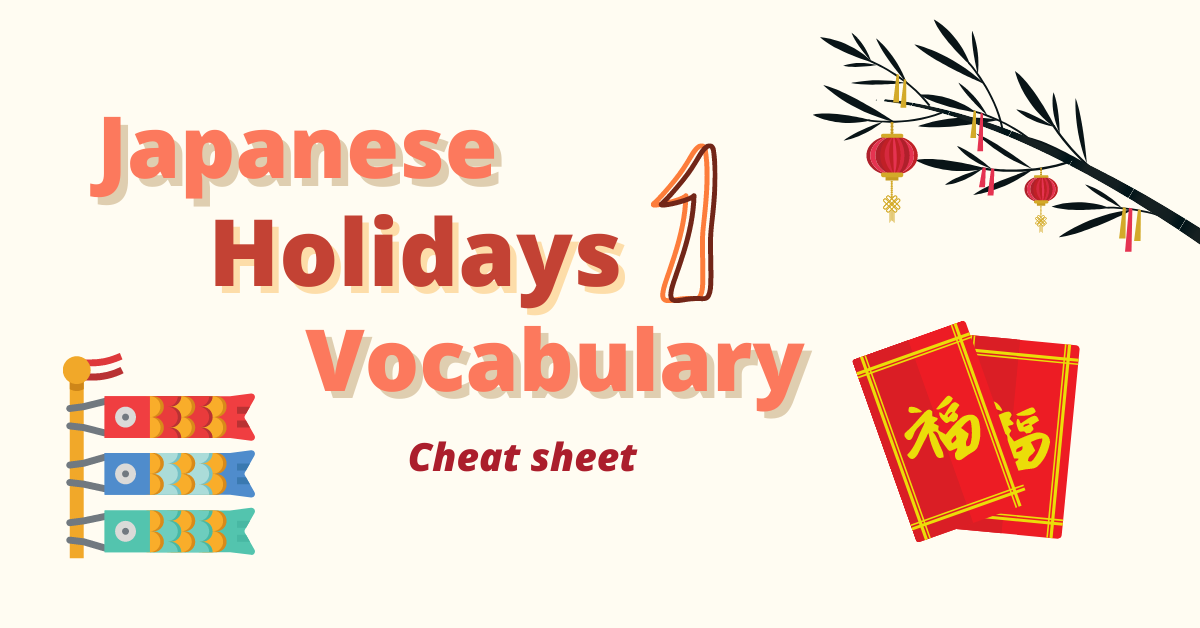Interested in Holidays in Japan? Check out this Japanese Vocabulary on Holiday cheat sheet to learn about the different holidays occurring from January to June!
Holidays happen all year round in Japan, and in this blog, we have classified them accordingly to the different months they take place in.
As this cheat sheet includes holidays from the first half of the year, for those in the second half of the year please refer to cheat sheet two.
Holiday 休日(きゅうじつ) / 祝日(しゅくじつ)
1月 (いちがつ Ichigatsu)
Holidays in January
| Japanese | Pronunciation | Meaning |
|---|---|---|
| 正月 | しょうがつ shōgatsu | New Years |
| 成人の日 | せいじん ひ seijin no hi | Coming of Age Day |
2月 (にがつ Nigatsu)
Holidays in February
| Japanese | Pronunciation | Meaning |
|---|---|---|
| 節分 | せつぶん setsubun | Beginning of spring |
| 建国記念日 | けんこくきねんび kenkoku kinen bi | National Foundation Day |
| 天皇の誕生日 | てんのう たんじょうび tennō no tanjōbi | Emperor’s Birthday |
3月 (さんがつ Sangatsu)
Holidays in March
| Japanese | Pronunciation | Meaning |
|---|---|---|
| ひな祭り | まつ hina matsuri | Doll’s Festival |
| 春分の日 | しゅんぶん ひ shunbun no hi | Spring Equinox Day |
4月 (しがつ Shigatsu)
Holiday in April
| Japanese | Pronunciation | Meaning |
|---|---|---|
| 昭和の日 | しょうわ ひ shōwa no hi | Showa Day |
5月 (ごがつ Gogatsu)
Holidays in May
| Japanese | Pronunciation | Meaning |
|---|---|---|
| 憲法記念日 | けんぽうきねんび kenpō kinen bi | Constitution Day |
| みどりの日 | ひ midori no hi | Greenery Day |
| こどもの日 | ひ kodomo no hi | Children’s Day |
6月 (ろくがつ Rokugatsu)
Month of June
There is no holiday in June. Instead, Japan experiences a long period of rainy weather, known as rainy season.
Japanese: 梅雨
Pronunciation: つ ゆ tsuyu
Meaning: Rainy Season
Example Sentences
Here are examples on how to use the vocabulary learnt in sentences!
Example 1:
By saying: ‘5月の上旬は祝日がたくさんあるため、ゴールデンウィークとも言われる。‘
Pronunciation: Gogatsu no jōjun wa shukujitsu ga takusan aru tame, gōruden wīku tomo iwareru.
It means: ‘Because the beginning of May has many holidays, it is also called Golden Week.’
Example 2:
By saying: ‘正月に食べる料理と言えば、お雑煮とおせちだ。‘
Pronunciation: Shōgatsu ni taberu ryōri to ieba, ozōni to osechi da.
It means: ‘A common meal to eat on New Years is ozōni and osechi.’
